Where the Creativity of Business Meets Art
Fifth Interview: Passion x Creativity (Part 2)
19 January 2024
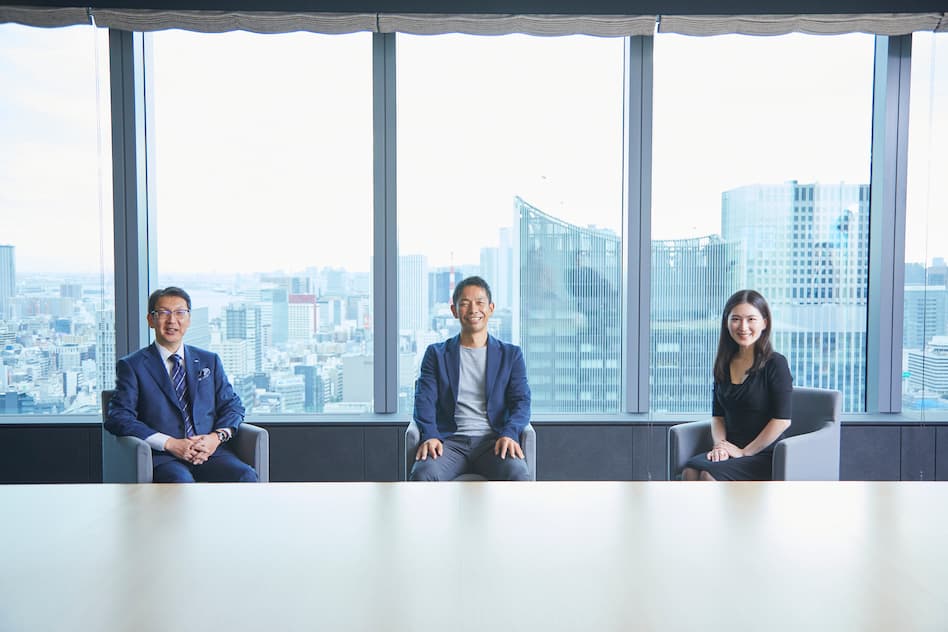
You exude a reassuring presence that you'll deliver. I get a very positive aura from you. (Tanaka)
Okuda: Having heard Ayako’s story before and now hearing yours, I can’t help but feel that both of you embody a certain level of daring, which I believe is the key to your success. The common denominator for success in entrepreneurial endeavors is the courage to dive headfirst, somewhat blindly. And as I listen to your conversation, the word “coincidence” comes up a lot. But I don’t think it’s just a coincidence. It's the three elements that you exude in your interactions, the three that Shintaro was praised for—your passion, your smiles, and your positive energy. These are what leave such an impression in people's minds. When the time is right, these impressions lead to connections, which is probably what happened with the interpreting job and your involvement in OUI Inc. This might be a new pattern for drumming up business. And I suppose you're here today because something about you stayed with me.
Tanaka: I think you exude a reassuring presence that you'll deliver. For some reason, I felt an aura of positivity when I saw your picture online.
Nakayama: That’s nice to hear. The fact that we're talking today is only because Mr. Okuda happened to remember me. Times like these remind me how truly blessed I am by the people around me.
Okuda: I believe it's what you radiate that attracts these coincidences. The next era of both business and the arts is one of value creation, and the ability to attract coincidences may be a significant factor when creating value. This power likely emanates from your energy, which is transmitted to others and remains in their hearts and minds. Eventually, it draws people together at the right moments, passing from person to person. That's what I gathered from your story.
Tanaka: As the children warmed up to you in Argentina, did you feel the positive energy grow inside you?
Nakayama: Yes. In Argentina, I befriended an immigrant from Spain. He took me to his family home, which was located in a poor neighborhood that guidebooks advised against visiting. He is reasonably well-off now, but he struggled to become a lawyer and hasn't left the neighborhood where he grew up. He is a father and told me that he wanted his children to have the freedom to go anywhere they wanted and mentioned how he enjoys seeing each generation progress and become more capable. Hearing this, I realized that Japan, for better or worse, has its limitations—a ceiling of sorts—and that the feeling he was describing is something we rarely experience here. It was a valuable experience to hear stories like his.
Okuda: Ayako once shared a story about the National Youth Orchestra of Argentina, where both poor and wealthy young people come and create music together, and the power that she feels from their performances. It's a similar narrative. Each generation gradually rises to a higher plane and becomes more prosperous, transforming progress into a driving force to work hard and find what they love. I wondered if these aspects are what attracted both of you to Argentina.
Nakayama: Indeed. Actually, I just remembered an intriguing experience I had in Argentina. A taxi driver once asked me, "Why is it that so many people commit suicide in Japan?” I suggested it might be due to losing their job, pessimism about the future, or an inability to bear responsibility, leading to despair. The driver laughed and said, “People die over stuff like that?” He added, "There are lots of people struggling with poverty and homelessness in Argentina, but they'd rather rob and steal to survive than commit suicide.” Regardless of the morality of his statement, I felt a stark contrast in their will to live, even if it meant stealing from others.
Okuda: Quite a different perspective on life and death.
Tanaka: I think Japanese people have a strong sense of responsibility. For example, in Japan, people hesitate to leave work and go home on time, worrying it might inconvenience their colleagues. Such a mindset is almost non-existent in Argentina. Once, when I confronted a friend in Argentina for being inconsiderate, they retorted, “Why should I think about other people?” Right or wrong, I wondered why we approached things so differently.
We cannot become a truly global company unless we understand differences in values and start operating on the basis of these differences (Okuda)
Okuda: I think this is crucial. The world is the result of a mixture of social and linguistic structures, histories, and many other factors that shape the values of each country and ethnic group. These values will never converge into a single entity; thus, we live amidst a mosaic of diverse values. This mindset is a significant barrier to overcome when becoming a global company. Even within our own company, the word "global" is used in many different ways. One person sees the America they've experienced as global. Another sees their version of Britain as global. Everyone thinks whatever region they've known is global. However, I don't believe that's what it really means. Just seeing the values of a country other than Japan doesn’t mean the same as being global. True globalism involves coexisting with different values, understanding them, and continuing to work and live within that context. To me, this means that we cannot become a truly global company unless we understand differences in values and start operating on the basis of these differences. Recently, the term "diversity" has been thrown around casually, but it's not just about having an equal number of men and women or being multinational. True diversity is reaching a point of understanding differences in values and being able to work together despite these differences.
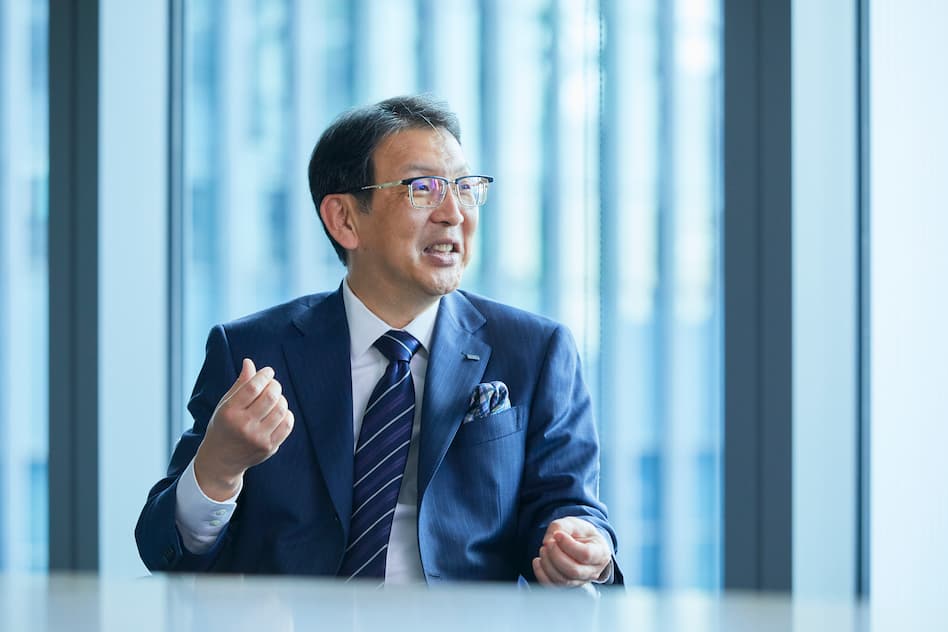
Diversity, I believe, hinges on one's capacity to embrace it. (Tanaka)
Tanaka: I sometimes wonder what diversity really means. As you say, it is not about hiring people of various nationalities. It's more about acceptance and having the capacity to appreciate values other than your own. It boils down to whether you can let things go and say, "Well, these things happen," when the unthinkable happens in another country. Some people can let it go, while others continue to wonder how such a thing could happen. But that, in and of itself, is diversity. There are many people with just as many personalities and ways of thinking here in Japan, let alone in the world, which makes me think, "Well, I just don't care." And I find "I just don't care" to be a very positive phrase.
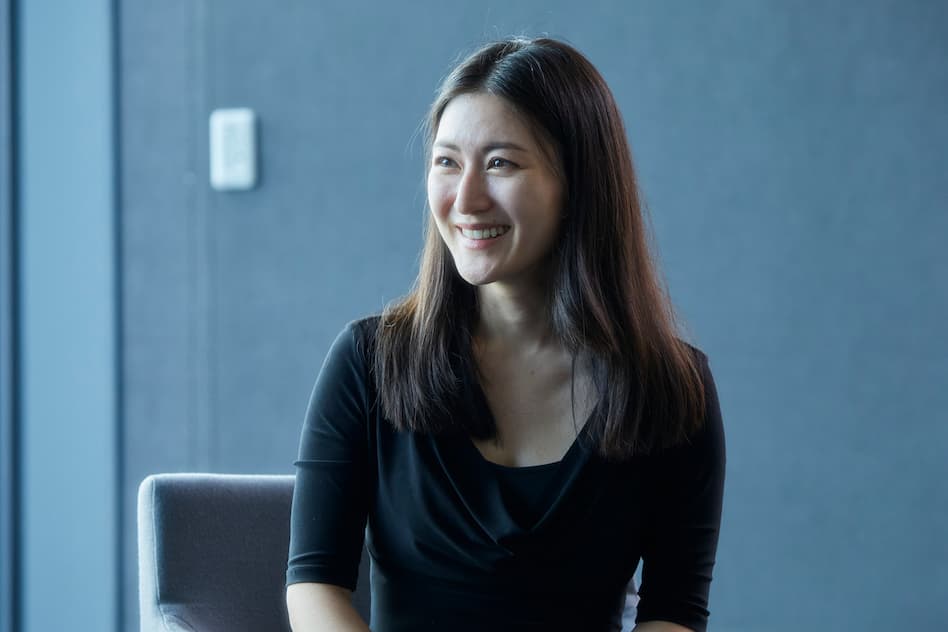
Okuda: Well said—that the act of not caring can actually be something positive. [laughs]
Tanaka: Listening to Shintaro talk, I was fascinated by his way of life. It’s almost as if he’s wandering leisurely through the desert.
Okuda: I meet plenty of startup CEOs who are determined to succeed. In your case, Shintaro, it seems to be more about developing your charisma—which leads to new encounters and finding the stories within them. You are able to turn those stories into earnings, which makes everyone involved happy. It’s a new style of living and working that I find intriguing.
Tanaka: How do you decide when to take action? Is it an epiphany?
Nakayama: No, I just try to do whatever I think is best at the time. But even then, I've tried plenty of things that didn't work out so well or weren't as interesting as I thought they would be. When that happens, I quickly move on to the next thing.
Okuda: What's something that you're passionate about at the moment?
Nakayama: Right now, I find my work at OUI Inc. fascinating and devote most of my time and energy to it.
Okuda: Does that involve a lot of international travel?
Nakayama: Yes, in fact, I went to East Timor recently. My work with OUI Inc. takes me to all kinds of places, including countries that I wouldn't visit otherwise. We feel that providing proper eye care to rural populations, for example, is appreciated wherever we go. It's a universal issue. "Eye care" and "healthcare" are two keywords that have allowed me to make friends just about anywhere in the world. I've been able to make valuable connections while enjoying what I'm doing. I've never experienced much difficulty in terms of diversity, despite any differences I might have with someone.
Okuda: When you travel around the world, do you usually have a point of contact in whatever country you're heading to? Or are you traveling to places without any prior contacts?
Nakayama: I usually know someone. I might also email a doctor about how moved I was by something they've published. This often elicits a response, which can lead to online correspondence.
Tanaka: Where have you traveled to so far?
Nakayama: Currently, we have ongoing projects in Africa in countries like Kenya, Mozambique, Nigeria, and Uganda, as well as in Vietnam, Cambodia, Bhutan, Thailand, the Philippines, Malaysia, East Timor, and India. In Latin America, I've been to Mexico, Paraguay, and Brazil. But actually, we’ve never done any work in Argentina yet.
Tanaka: Have you started noticing things that many countries have in common?
Nakayama: As I mentioned earlier, the scarcity of ophthalmologists, concentrated mainly in urban areas, and the lack of eye care infrastructure in rural regions are common issues the world over.
Okuda: I’m sure that’s surprising to many Japanese people.
Nakayama: Even in Japan, where there are more than 10,000 ophthalmologists, most are concentrated in urban areas, so the reality is that many patients in rural and remote areas struggle to access eye care. While remote consultations are possible, treatments like surgery can't be conducted remotely, so collaborating with local doctors for on-site treatment is crucial. Nonetheless, delivering diagnoses from afar can still solve many issues, so we're experimenting with starting with what we can do and gradually expanding our efforts.
The way you don't label things as failures and how you don't perceive them as such is very intriguing. (Tanaka)
Okuda: I think we've gotten to the heart of what makes you tick, Shintaro, but I wonder what kind of experiences led you to be the person you are today.
Nakayama: Well, I don't consider myself to be anyone special.
Tanaka: Earlier, you described some of your experiences as not as interesting as you thought they would be. The way you don't label or perceive things as failures is very intriguing.
Okuda: Many people talk about their failures as struggles, but talking to you, it’s interesting that you don’t have any stories like that. I'm really curious as to how your personality developed.
Nakayama: I think my roots lie in my time studying in Australia, my interest in countries outside Japan, and my experience starting a lacrosse team. Embarrassingly, I initially chose to study abroad after a tough breakup, where my girlfriend ended things quite unexpectedly. I was in agony and had no outlet for all my pent-up energy when I happened to come across the opportunity to study abroad. It's a sad memory from my youth, but without that experience, I probably wouldn't have left Japan and would have led a completely different life.
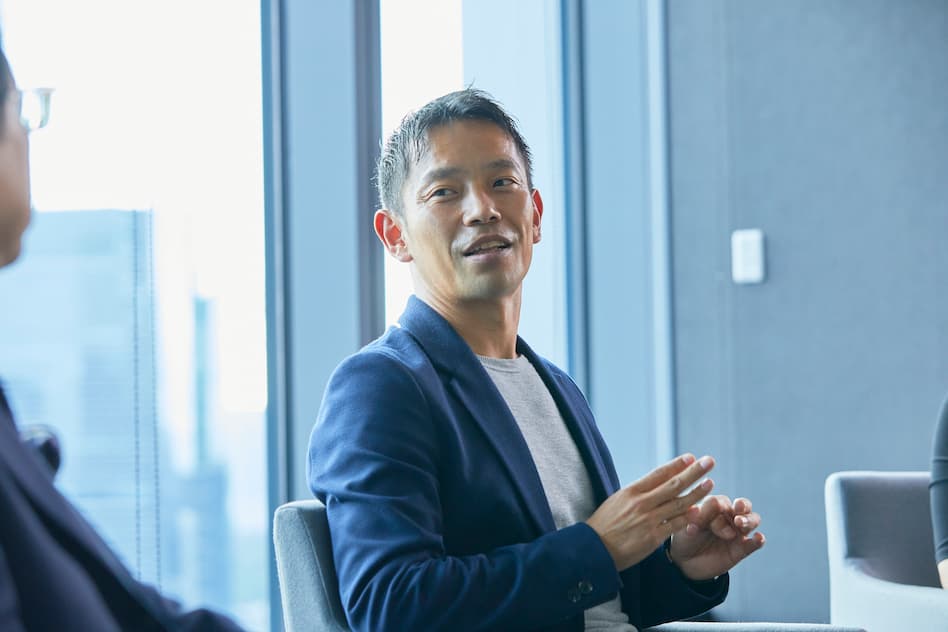
Okuda: So you're saying it wasn't a deliberate choice but a product of chance? Everyone has these turning points in life, and it’s interesting to see how some people change at these moments while others don’t. It’s also interesting to note that the things you saw and experienced in Brisbane and the fun you had creating a lacrosse team there contributed to shaping the person you are today.
Forming a network of people who share a charismatic connection and then conceptualizing a business from there might indeed be a novel approach. (Okuda)
Okuda: To me, it seems that your relationship with Argentina might have happened by chance, but in Ayako’s case, the connection was inevitable. I’ve heard that musicians in Europe tend to visit Argentina in the summer.
Tanaka: That's right. No matter what I do, the connection to music is fundamental. I find Shintaro's approach astonishing—it's like he can roam the desert without deciding on a destination. I’m not as free-spirited.
Okuda: Shintaro, you are indeed a rare individual. And you may have touched on a novel approach—forming a network of people who share a charismatic connection and then conceptualizing business from there. It feels like a next-generation approach to work, unburdened by preconceived notions.
I’ve been appointed as the director of a school that values the idea that music and the arts are necessary for children to become important figures in the international community. I don’t believe that arts and culture are just about feeling good or adding a bit of vibrancy to life. They are essential elements that should be at the heart of any society. (Tanaka)
Okuda: Ayako, you are incredibly curious and adept at networking with all sorts of people. I was surprised to hear you've been appointed as the director of AICJ Oshu Gakuen, a school in Hiroshima. How did this come about?
Tanaka: When I first performed my mono opera at Kamigamo Shrine, I was introduced to a couple who manage an educational corporation. It turned out that they had been following my career for some time, but at the time, we just exchanged details. A few years later, they approached me with something to discuss, which is when they asked me to become director. The school values language and other basic subjects in addition to music and the arts, which are necessary for children to become important figures in the international community. I was so surprised that they wanted me to become the director and share my life experiences directly with the children.
Okuda: That’s wonderful. That’s something I’ve been thinking about a lot, too. Businesses today need to engage in ventures that address problems in society and across the planet. It’s about transitioning to a business model of value creation, as is commonly mentioned. And when you create value, artistic sensibility is crucial. Here, artistic sensibility doesn't just refer to product design but rather a willingness and ability to create something new amid the trends and social atmosphere of the times. To do so, we must clear our minds, sharpen our senses, imagine solutions, and then share them with our colleagues to create a viable business. It’s an immensely challenging thing to do.
When thinking about how to train people capable of doing this, I believe it’s impossible to reach a point where they can create value without a balance between the ability to think and the ability to feel. This isn't something that can be learned at school; it depends largely on whether you have access to an environment that nurtures a rich sensitivity. In this respect, I agree with the current global trend that key world players must be versed in arts and culture to survive internationally. I understand their reasoning behind selecting you as director.
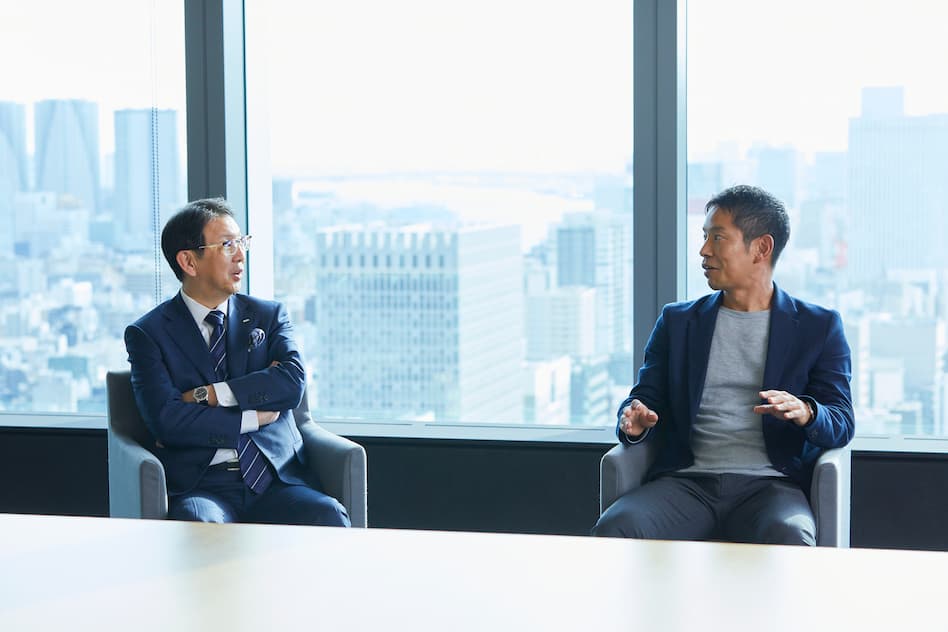
Tanaka: I think it was a courageous decision on their part. I can’t help but wonder how the world would change if more schools like this emerged. I don’t believe that arts and culture are just about feeling good or adding a bit of vibrancy to life. Instead, they are essential elements that should be at the heart of any society. So I’m curious how much the world might change if schools like these become the norm.
Okuda: We could go on endlessly, but it’s about time to wrap things up. Thank you both for the very interesting discussion.
Postscript
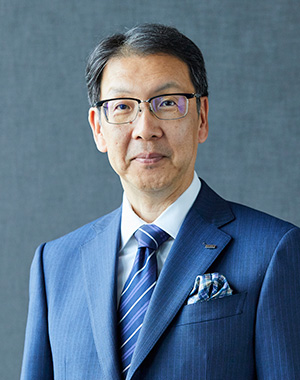
I believe Shintaro Nakayama's greatest asset is his charisma, or his “positive aura,” as Ayako described it. It's this charisma that attracts a variety of business opportunities from those captivated by his personality. The way Shintaro develops these interactions into businesses, selecting what he finds interesting and leveraging his global network, strikes me as emblematic of a new, modern approach to entrepreneurship. Mr. Nakayama's philosophy of maintaining his passion, smile, and positive energy encapsulates the foundation of his business success. This conversation was a vivid reminder of the diverse ways businesses can be made.
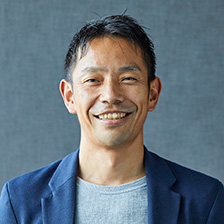
Shintaro Nakayama
Founder, Life as Caravan
Shintaro Nakayama was born in Tokyo in 1982. He graduated from the Hitotsubashi University Faculty of Law in 2006. After working in infrastructure development in the Middle East, Asia, and Latin America at the Japan Bank for International Cooperation (JBIC), Japan International Cooperation Agency (JICA), and Mitsubishi Corporation, he became the Vice President of non-profit organization Cross Fields before starting his own business, Life as Caravan, in 2019. He worked as the accompanying interpreter for the Argentina national rugby union team at the 2019 Rugby World Cup in Japan and is COO at OUI Inc., an ophthalmology startup launched at the Keio University School of Medicine, handling domestic and international business development.
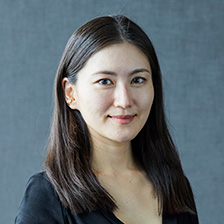
Ayako Tanaka
Soprano singer
President, Japan Association for Music Education Program
At the age of 18, Tanaka traveled to Vienna alone to study. At 22, she made her debut at the Stadttheater Bern in Switzerland, becoming the youngest soloist ever in the theater and the first Japanese person to perform there. Since then, she has performed in Vienna, London, Paris, Buenos Aires, and many other cities worldwide. Tanaka won “Best World Premiere Piece” by the Argentine Music Critic Association for her performance of Esteban Benzecry's “The 5 Cycle Songs for Coloratura Soprano and Orchestra" in Buenos Aires. The album received five stars from the BBC Music Magazine, the world's best-selling classical music magazine.
Tanaka is also engaged in giving back to society through activities such as the SCL International Youth Music Festival held in Vienna with the support of UNESCO and the Austrian government to assist young performers, as well as the National Youth Orchestra of Argentina, which was established with the support of the Argentine government to provide education to young people of various backgrounds and family situations through music.
Tanaka was named one of Newsweek's "100 Most Respected Japanese in the World" in 2019. She sang the Japanese national anthem on October 22 at the opening ceremony of the SMBC Nippon Series 2022. Born in Kyoto, Tanaka lives and works in Vienna.
RELATED STORIES
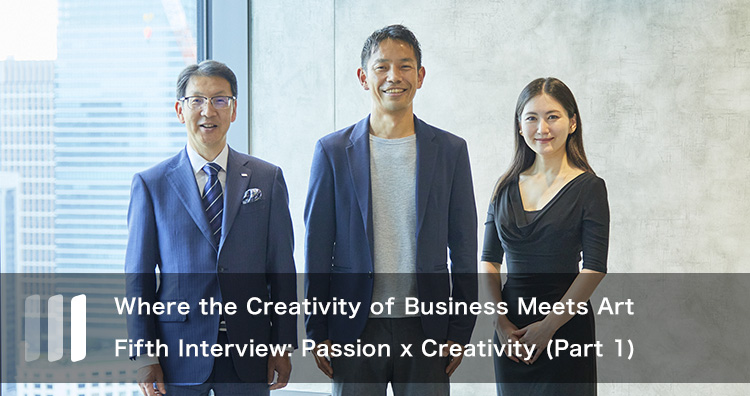
Where the Creativity of Business Meets Art Fifth Interview: Passion x Creativity (Part 1)
Today, we have the pleasure of hosting Mr. Shintaro Nakayama, representative of Life as Caravan.

Where the Creativity of Business Meets Art Fourth Interview: Advanced Technology x Creativity (Part 1)
Today, we're honored to have Dr. Masakazu Sugiyama, Director of the Research Center for Advanced Science and Technology…

Where the Creativity of Business Meets Art Fourth Interview: Advanced Technology x Creativity (Part 2)
To me, tonal quality is an expression of emotion that communicates a feeling directly.

